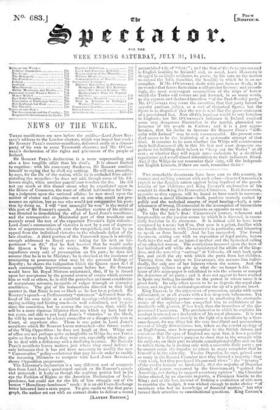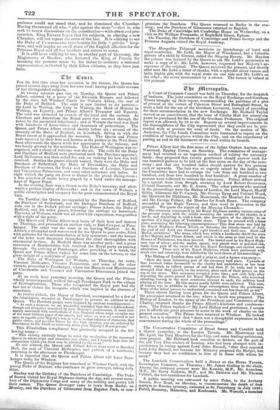Two remarkable documents have been sent to this country, in
strange and striking contrast with each other—Queen CHRISTINA'S protest to the Spanish nation against being deprived of the guard- ianship of her children; and King ERNEST'S explanation of his conduct in dissdking the Hanoverian Chambers. Both documents, opposite as they appear, will be found to have much in common: both evince a moral blindness—both, passions scarcely curbed by poliey:and the technical reserve of royal bearing—both, a con- sciousness of 'wrong, ill-concealed in the assumption of immaculate right. Yet they are in other respects as opposite as can be. To take the lady's first : CHRISTINA'S protest, vehement and irrepressible as the passion seems by which it is dictated, is essen- tially feminine in its character. It is indeed said to have been composed by a man ; but if so, that man is a priest, familiar with the female character, with CHRISTINA'S in particular, and labouring to speak as from herself. And he has succeeded. The formal document, setting out with an exposition of legal points, bursts forth into the wail of an injured mother and the hysterical railing of an offended woman. The restrictions imposed upon the bent of her individual will while she administered the affairs of the king- dom, and the crowning "outrage" at Valencia, all rush back upon her, and swell the cry with which she parts from her children. Turtling from the nation to ESPARTERO, she accuses him indivi- dually, the only one of her injurers whom she names. And she passionately refuses to give up what she no longer holds. The tenor of this state-paper is calculated to win the esteem or compel the deference of no party ; and it does not appear to have excited in Spain any feeling favourable to the person in whose name it is given forth. Its only effect seems to be to degrade the royal cha- racter, and to give to national questions the air of a private brawl. King ERNEST, in the enjoyment of possession, speaks with more self-control, or at all events with a less desperate vehemence. Yet the sense of arbitrary power—success in combating the encroach- ments of free opinion—has compelled him to exhibitions of in- domitable will, grosser, if less loud, than the invectives of the dis- possessed CHRISTINA. The proclamation in which he explains his conduct is uttered as a declaration of his royal pleasure. It is not remarkable considered merely in the light of a manifesto by a Ger- man despot, for any thing but the very inartificial and unconscious avowal of kingly frowardness; but, taken as the careful apology of an Englishman, once heir-presumptive to the British throne, and conscious that the eyes of England are upon him, it has a peculiar interest. It is ERNEST'S purpose to show that in the struggle with his subjects, on their part to obtain constitutional rights and on his to refuse them, he is dealing only with a miserable little party ; yet he cannot resist the impulse to admit in angry complaint that he himself is in the minority. Twelve Deputies, he says, gained over so many in the Second Chamber that they formed a majority : they 7 were weak, but they paralyzed his paternal views " : the " tyranny of the twelve became so intolerable, that the majority of Deputies (though of course supported by the Government) "quitted the Assembly, not daring to support a contrary opinion" :ttle _Chamber thrice elected, by an absolute majority, a Presidynt- l_i ostile to the King; and at the last, instead of forming a committee of able men to consider the budget, it was wicked enough to- make choice " of members who had no knowledge of financial-matiters," but who turned their attention to constitutional questioni.. King ERNEST'S patience could not stand that, and he dismissed the Chamber. Having threatened all who " plot against the state "—that is, who seek to renew discussions on the constitution—with arrest and pro- secution, King ERNEST hopes that his subjects, in electing a new Chamber, will not repeat the error of the last. It is edifying to see the Duke of CUMBERLAND browbeating his little " private " king- dom, and will inspire no small share of the English affection for the Princess Royal and all her brothers and sisters to come.
It is still more edifying to see, in another part of Germany, the Magistrates of' Breslaw, who lectured the King of Prussia for breaking the promise made by his father to institute a national representation, reelected by their fellow citizens, as they have just been.



























